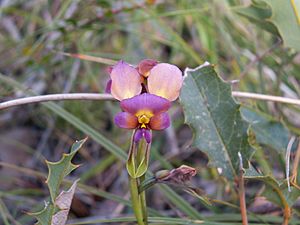Purple pansy orchid facts for kids
Quick facts for kids Purple pansy orchid |
|
|---|---|
 |
|
| Diuris longifolia growing in Mount Barker. | |
| Scientific classification | |
| Genus: |
Diuris
|
| Species: |
longifolia
|
The Diuris longifolia, also known as the purple pansy orchid, is a special type of orchid. It is only found in the southwest part of Western Australia. People also call it the donkey orchid or wallflower orchid. This orchid was one of the very first ground-growing orchids from Western Australia to be given a scientific name.
About the Purple Pansy Orchid
The purple pansy orchid is a plant that grows from a tuber (like a small potato underground). It lives for many years. This plant has long, thin leaves that are about 10 to 20 centimeters (4 to 8 inches) long.
Its beautiful flowers are about 2.5 to 4.5 centimeters (1 to 1.8 inches) long. They have a mix of purple, yellow, and brown colors. You can usually see these flowers blooming from September to November.
How it Got its Name
The purple pansy orchid was first described by a scientist named Robert Brown. He wrote about it in his book in 1810. The first plant sample was collected by Archibald Menzies in 1791. He found it near a place called Frenchmans Bay, which is now the city of Albany. Menzies was a doctor and a nature expert on a ship called HMS Discovery.
The scientific name longifolia comes from two Latin words. Longus means "long," and folium means "leaf." So, longifolia means "long-leaved," which describes the plant's leaves.
Where it Lives
This orchid only grows in the southwest corner of Western Australia. It can be found in areas like the Jarrah Forest, Swan Coastal Plain, and Warren regions. It likes to grow in moist places. You can find it in sandy soil, clay, or even soil with small rocks.
Is it Safe?
Good news! The Diuris longifolia is not currently in danger. It is not considered a threatened species.

